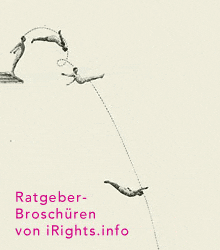Wie geht’s weiter mit der Schutzdauerverlängerung für Musikaufnahmen?
Martin Kretschmer berichtet von der komplexen Auseiandersetzung um die Schutzdauerverlängerung für Musikaufnahmen, die er ablehnt (mein Interview dazu hier). Besonders aufschlussreich: “Several MEP assistants told me that they had received offers for concert tickets of famous artists.” (“Einige Assistenten von MdEP haben mir erzählt, dass ihnen Karten für Konzerte berühmter Musiker angeboten wurden.”).
Was es schwierig mache, die MdEP davon zu überzeugen, dass die Schutzdauerverlängerung den Musikern nichts nützt, sei natürlich vor allem, dass sich Interessenverbände von Musikern dafür einsetzen. In England gab es sogar eine Videobotschaft im Namen von 38.000 Musikern, die die Verlängerung fordert. Das wirft auch ein bezeichnendes Licht auf die Probleme, die die Interessenvertreter mit der Empirie haben. Leider ist das in Deutschland oft nicht anders.
Martins eMail gewährt einen interessanten Einblick in das, was derzeit in Brüssel veranstaltet wird. Leider nur auf Englisch, aber ich habe keine Zeit, sie zu übersetzen.
Copyright Extension Directive
Dear colleagues,
Many of you have asked for an update. The process has become so complex that it is hard to provide a short summary.
Both European Parliament and Council of Ministers have to agree a joint text. The procedures run in parallel.
In the Council of Ministers, the French Presidency is pushing very hard to come to an agreement at the Competitiveness Council next week but there is considerable resistance. Only Estonia and Cyprus appear to have come out in favour. I believe an official ‘against’ position is recorded from Netherlands, Italy, Austria, Finland, Sweden – and a position ‘something for performers but not in this form’ from UK, Poland, Belgium.
It is very likely that the Directive will be pushed into the Czech presidency which takes over in January (and will be much less keen).
In the European Parliament, the lead committee is Legal Affairs (JURI). The rapporteur is Brian Crowley, an Irish party colleague of McCreevy, and strongly in favour. Feeding committees (which all can propose amendments) are Culture and Education (CULT), Industry, Research and Energy (ITRE), and Internal Market and Consumer Protection (IMCO).
Lionel Bently (who spoke as invited expert) and I both attended the JURI public hearing on 4 November. I attach Lionel’s address.
Tilman Lüder, head of the Copyright Unit at DG Market made a heated statement, attacking the joint academic position. He was subject to a point of order.
IFPI has been mounting a sustained operation, and we saw numerous industry lobbyists a work. In return, Open Rights made a valiant effort, and Open Rights’ sound copyright campaign is still a key ally.
Several MEP assistants told me that they had received offers for concert tickets of famous artists. All the rapporteurs of the feeding committees had been cultivated, and wrote supportive reports BEFORE the public hearing (mostly asking for an inclusion of audio-visual performers). Within committee politics, rejection did not seem an option to most MEPs we spoke to. For MEPs it is troublesome that performer organisations speak in favour of extension. Critical MEPs lack a publicly persuasive lobby partner.
The feeding committees will vote in early December. Rufus Pollock, Lionel Bently and I have fed a number of amendments to receptive MEPs. There also have been moves from the European broadcasters (mandatory collective administration for extended term as applying to digital broadcasting archives). It has to be said that the broadcast lobbyists woke up much too late.
The only openly sceptical parliamentary group are the Greens. Sharon Bowles (liberal/ALDE MEP in JURI) is making an effort with a set of amendments, linking extension to a registration system for instances of inadequate remuneration for the performer (administered via OHIM, the European Trade Mark Office in Alicante, and subject to licences as of right). EPP (centre right) and PES (socialists) as parliamentary groups appear to support 95 years.
The best we can hope for in the European Parliament is that there are enough irreconcilable amendments voted through in ITRE (11 December), so that JURI (scheduled vote 19/20 January) will ask for more time, or an independent study.
As we stand, a plenary vote is scheduled for February. Any spanner in the works may take us into the next parliament and a new commission (European elections: 4 June).
In the UK, DCMS is still sitting on the fence, but DIUS is holding the line (backed by Cabinet Office).
Lastly, I attach a set of three amendments (mainly in Lionel Bently’s words) that may form the nucleus of an acceptable way forward (if there is a stalemate between Council and Parliament). The basic idea is to give an extension to performers only (life or 50 years, the current Greek law), and address the access issues via collecting societies. In addition, we propose a use-it-or-lose-it provision during the current term. This third amendment needs some work on procedure for recovering rights. prof-bently-juri-speech.pdf (184 KB) | amendments-extension-directive-academics.pdf (128 KB)
</a>
In summary, everything hangs in a delicate balance. Any appearance of dissent in the media will be important.
Please feel free to circulate this note.
—
Martin Kretschmer
Professor of Information Jurisprudence
Director, Centre for Intellectual Property Policy and Management
Bournemouth University
Talbot Campus, Poole
UK – Dorset BH12 5BB
URL: www.cippm.org.uk






Was sagen Sie dazu?